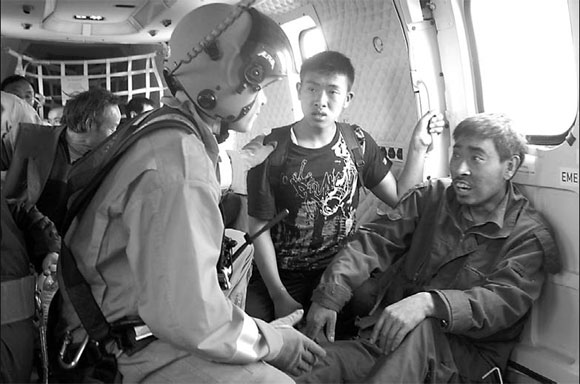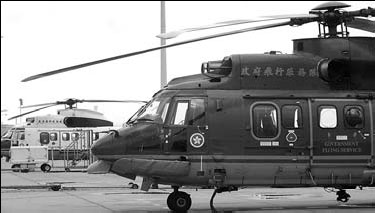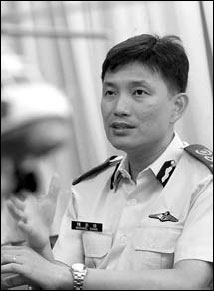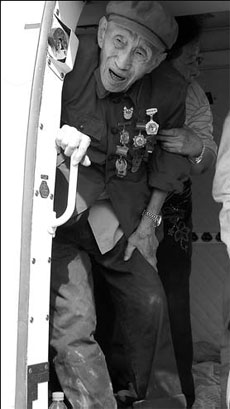No time for Plan B
|
A father (right) is rescued after his son (middle) walked for three days seeking help. |
There can be broken lives and broken dreams, but there can't be broken promises - at least not when the rescue team of the Hong Kong Government Flying Service (GFS) is involved.
On the morning of May 19, the team spotted a group of people trapped in a quake-ravaged mountainside in northwestern Sichuan, 2,000 m above sea level. Upon seeing the helicopter, the crowd went crazy, frenetically waving whatever they could find to attract attention. But after dropping food and water, Tang Sing-tung, pilot and chief commander, ordered his team to go back.
"We went back because we needed to work out a plan to save all of them," Tang says.
|
The Hong Kong Government Flying Service (GFS) Super Puma L2 helicopter can carry 10 people at a time. Photos courtesy of GFS |
There were more than 30 people, and Tang's helicopter, a Super Puma L2, could carry at most ten people at one time. Besides, since there was no place to land, the helicopter would have to hover overhead while a hoist was extended to the ground. It would take on average 40 minutes for 10 people to climb up and board the plane.
"We needed enough fuel to keep the helicopter in a hovering position for at least 40 minutes - an amount we didn't have that day," Tang says. "To ensure the safety of our staff and the success of the operation, we needed to be fully prepared."
The next day on May 20, Tang and his team returned - three times - to hoist all 30-plus people out of their nightmare. "All of them were alive," he says, showing a picture in which the inside of the helicopter was turned into an ad hoc hospital ward by the rescued quake victims.
Tang recalls the experience - his first rescue operation in Sichuan - inside his office at the GFS on May 30.
The next morning, four days after he returned to Hong Kong, the captain left for the quake zone once again. "I want to get back there," he says during the interview. "Not for one moment can I erase from my mind the images I have seen over the past two weeks."
With airplanes taking off at short intervals from nearby Hong Kong International Airport, the only sound one is likely to hear in this part of the island is the constant drone of planes. But outside the GFS building there is little traffic and almost no one in sight - a scene in total contrast from what Tang saw when he first arrived at the Chengdu Airport on May 17, five days after the earthquake struck.
"It was chaotic. Many of the rescue teams were just arriving. Everyone was running around - soldiers, doctors, nurses, even the dogs. And rescue equipment lay scattered on the ground," he recalls. "That was my first taste of what was to come."
|
Captain Chan Chi-pui of the GFS is responsible for coordinating the group's rescue effort. Edmond Tang |
On that same day, Tang and his fellow members of the GFS team were transported to the Guanghan Airport, 80 km from the epicenter of the quake, where all the rescue teams of the civil airlines were based. There were eight of them, including another pilot, two air crewman officers, one liaison officer and one engineer (another two joined later).
However, Tang didn't realize what had happened to this part of China until a day later.
As the helicopter climbed higher and moved horizontally deeper and deeper into the mountainous areas, the full scope of the catastrophe became clear.
Wherever one looked, it was the same picture - buildings torn apart, upturned trucks and debris-covered mountain roads.
"It went beyond my wildest imagination," says Tang, struggling for words to convey the impact that scene had on him.
"I could feel the vehemence with which Nature had lashed out - large chunks of the mountains had been yanked off and broken into numerous shards. The entire village had been reduced to ground zero, except for a few buildings that stood in a sea of rubble.
"The whole site resembled a giant bomb crater."
The saving of lives - lives that had fought and triumphed against all odds - turned out to be the most daunting task ever faced by Tang and his teammates.
However, compared to those working on the ground, either rummaging through the rubble or operating under a makeshift tent, Tang and his fellow members of the GFS rescue team may have seen fewer bodies and fractured souls. Instead, they encountered amazing individuals who just wouldn't give up.
In one case, a boy walked continuously for three days, from a mine in the depths of the mountain where his father was trapped, to the air base looking for help.
"We went with him. As our helicopter flew over rivers and valleys in the direction that he pointed, the boy suddenly started shouting: 'Turn back! We've passed him!'" Tang says.
"But of course, we hadn't. The boy had no sense of the relative distance between us and the ground.
"I looked at his face and saw an indescribable mix of hope and despair. It seemed like his entire being, by that time already very fragile, was sustained by the single thought that his father might still be alive. At that time I asked myself: 'What am I going to say to him if we are too late?'"
In the end Tang didn't have to say anything because the father, after lying under a truck for three days with a broken leg, didn't succumb.
And then there was this veteran soldier who, upon being rescued, pinned all his medals on his over-worn fatigues. "Honor is what's most important in his life," Tang says. "That man was staring down at death, as he must have done many years ago on the battlefield."
Now it was Tang and his colleagues in the battlefield. "In the past two weeks I have used everything I've ever learned over the past two decades," says the captain who joined GFS in 2001 and has since participated in numerous rescue efforts both on land and at sea.
"It's true that Hong Kong also has mountains. But the average mountain in Sichuan is double the height of Hong Kong's highest peak. Besides, the sheer scale of the mountainous region in Sichuan is much, much larger."
|
A veteran soldier with all his medals in uniform upon being rescued. |
Since the quake has drastically altered the topography of the land - many places are completely unrecognizable - maps can no longer offer guidance. Compounding the situation is the thick mist that shrouds the mountains for most of the day and considerably reduces visibility.
The fact that they have to fly at a high altitude doesn't help either. "The air is very thin on Western Sichuan Plateau which is near the quake's epicenter. And since a helicopter is built on the principle of aerial dynamics, it becomes obtuse in rarified air."
However, the situation only turns more complex, if not totally unpredictable, as one nears the ground. Anything can pose a danger - from the powerful recirculation formed in the deep valley to the damaged but still dangerous high-voltage transmission line that can only be seen from a relatively short distance.
"In any rescue operation, you usually have Plan A and Plan B, which is a back-up plan to ensure staff safety. But on more than one occasion, we went ahead even when there was no Plan B. We didn't give ourselves a second chance because those who were waiting for us didn't get one."
By June 1, the Hong Kong GFS team had saved 99 lives over 16 rescue flights.
According to Captain Chan Chi-pui, controller of GFS who stays in Hong Kong and is responsible for coordinating the group's rescue effort, the most important thing at a time like this is to stay calm.
"Before they left for Sichuan, I warned them never to let their emotions interfere with professional judgment. Everyone who's involved should know that this is not about giving up on anyone, but about saving the most lives possible within the shortest time," he says. "It could be really tough sometimes."
But for Tang, the toughest moment came at the very beginning, when he first went into the air above the devastated land.
"I can never wipe it from my mind. And the saddest thing is that even then one could imagine how beautiful the place once was," he says, taking a long pause.
"Of all the 6,500 flying hours that I have, the few dozens I put in Sichuan will stay with me for the rest of my life."
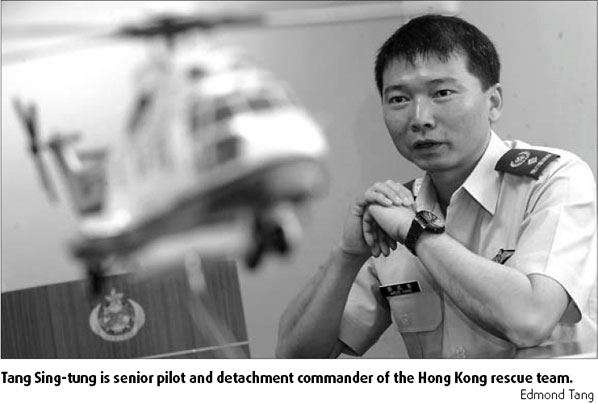
(China Daily 06/04/2008 page20)


